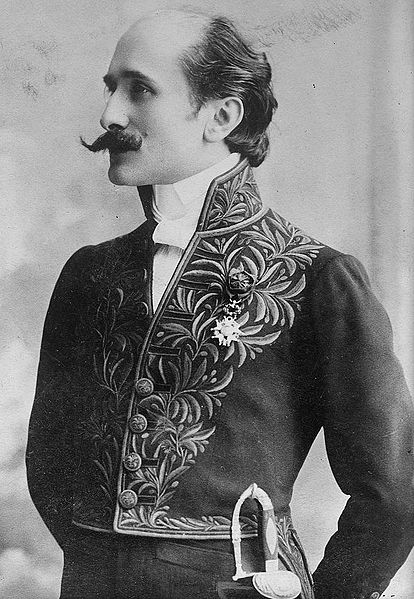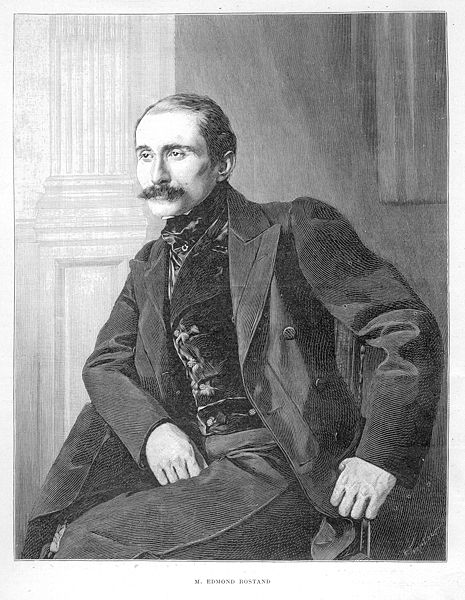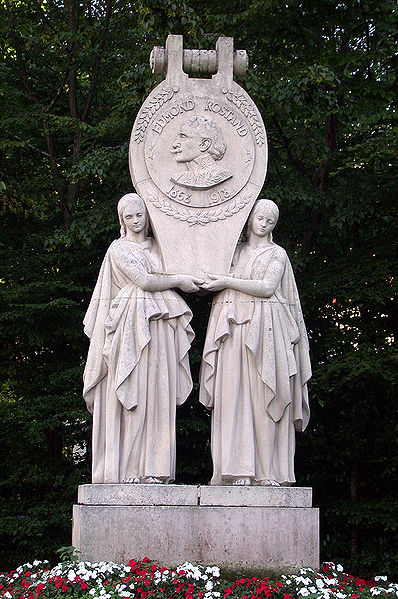<Back to Index>
- Philosopher Joseph Marie, comte de Maistre, 1753
- Writer Edmond Eugène Alexis Rostand, 1868
- President of the Swiss Federal Council Jean Pascal Delamuraz, 1936
PAGE SPONSOR



Edmond Eugène Alexis Rostand (1 April 1868 – 2 December 1918) was a French poet and dramatist. He is associated with neo - romanticism, and is best known for his play Cyrano de Bergerac. Rostand's romantic plays provided an alternative to the naturalistic theatre popular during the late nineteenth century. Another of Rostand's works, Les Romanesques, was adapted to the musical comedy, The Fantasticks.
Rostand was born in Marseille, France, into a wealthy and cultured Provençal family. His father was an economist and a poet, a member of the Marseille Academy and the Institut de France. Rostand studied literature, history, and philosophy at the Collège Stanislas in Paris, France.
His first play, a burlesque, Les romanesques was produced on 21 May 1894 at the Théâtre Français. Another early play, La Princesse Lointaine, was based on the story of the troubadour Rudel and the Lady of Tripoli. This play opened on 5 April 1895 at the Théâtre de la Renaissance. The part of Melissande was created by Sarah Bernhardt, who also was the original Photine of La Samaritaine (Theatre de la Renaissance, 14 April 1897), a Biblical drama in three scenes taken from the gospel story of the woman of Samaria.
The production of his heroic comedy of Cyrano de Bergerac (28 December 1897, Theatre de la Porte Saint - Martin), with Benoît - Constant Coquelin in the title role, was a triumph. No such enthusiasm for a drama in verse had been known since the days of Hugo's Hernani. The play was quickly translated into English, German, Russian and other European languages. For his hero he had drawn on French 17th century history.
In L'Aiglon he chose a subject from Napoleonic history, suggested probably by Henri Welschinger's Roi de Rome, 1811 - 32 (1897), which contained much new information about the unhappy life of the Duke of Reichstadt, son of Napoleon I, and Marie Louise, under the surveillance of Metternich at the Schönbrunn Palace. L'Aiglon in six acts and in verse, was produced (15 March 1900) by Sarah Bernhardt at her own theatre, she herself undertaking the part of the Duke of Reichstadt.
In 1901, Rostand became the youngest writer to be elected to the Académie française. Chantecler,
produced in February 1910, was awaited with an interest, enhanced by
considerable delay in the production, hardly equaled by the enthusiasm
of its reception. Lucien Guitry was
in the title role and Mme. Simone played the part of the pheasant, the
play being a fantasy of bird and animal life, and the characters
denizens of the farmyard and the woods. Rostand was married to poet Rosemonde Etienette Gerard who, in 1890, published Les Pipeaux: a volume of verse crowned by the Academy. The couple had two sons, Jean F. and Maurice. In the 1900s, Rostand came to live in the Villa Arnaga in Cambo - les - Bains in the French Basque Country looking for a cure for his pleurisy. The house is now a heritage site and a museum of Rostand's life and Basque architecture and crafts. Rostand died in 1918, a victim of the flu pandemic, and is buried in the Cimetière de Marseille.